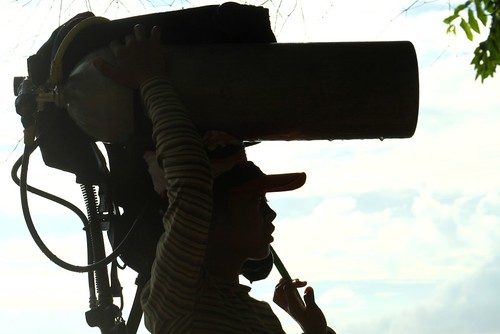
A dark cloud glided slowly over Tulamben beach that quiet morning. Two local women walked along the shoreline carrying scuba tanks on their heads.
They belonged to a group of local porters, who carry all the heavy equipment for scuba divers.
Tulamben is one of the island’s most favorite diving spots. Around 20 meters from the shoreline, the famous World War II’s wreck of the USAT Liberty lies on Tulamben’s sandy bottom, waiting for the divers.
That morning, dozens of foreign visitors had flocked the beach, ready to explore its underwater treasure of beautiful coral reefs and fish.
The scuba porters approached the visitors and offered their services. For a small fee, the porter carries the scuba tanks and diving apparatus from the beach’s parking facility or the visitor’s hotel to designated diving spots.
Each porter can carry up to 50 kilograms of gear in one trip. Once the divers are finished exploring the underwater world, the porter carries the diving gear back to the parking facility or hotel.
“We can make up to 25 round trips a day,” porter Ni Nengah Sari said, adding that she only used a thin cloth on her head to cushion the weigh of the tanks.
Sari and her female colleagues work from 5.30 a.m. to 4 p.m. Scuba diver coming for a night dive can use the services of male porters.
“The male porters work until 9 p.m.,” she said.
Sari noted that the number of diving porters had increased in line with the growing popularity of Tulamben. The beach became a tourist hotspot in the 1970s, with just 10 diving operators.
Nowadays, hundreds of diving operators operate in Tulamben, serving visitors from diverse
nationalities.
“In the old days, it was each to their own, with porters often locked in bitter conflict over clients,” a male porter Gde Pasek said.
Eventually, porters created an association to prevent such conflicts from taking place. Known as Sekar Baruna, the association now has 29 members. Divers simply need to notify the association that they need a porter’s assistance and the association will pass on the job to one of its members.
“The diver pays the association, which then distributes the revenue evenly to all members,” Sari said, adding the association charged Rp 9,000 for a round trip.
“The porters get paid every two days,” she added.
Porters earn up to Rp 90,000 a day during the busy season, and Rp 30,000 on a quieter day — a fraction of the Rp 600,000 diving fee charged by operators for a single dive. The porters, however are happy with their earnings.
“The important thing is we can still afford to buy rice every day for our families,” Gde said.
Article published at The Jakarta Post.


Leave a Reply